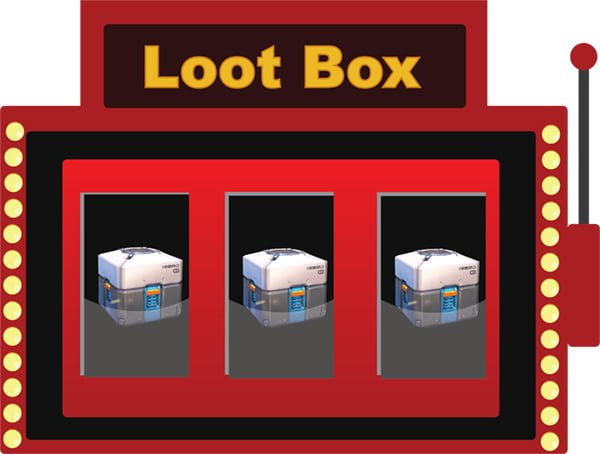Loot boxes spark controversy among gamers, legislators

Victoria Williamson | The DePaulia
There was a time when, if you bought a video game, all of its content was available to you right out of the box.
It’s not quite that simple anymore.
Nowadays, the video game industry generates a great deal of its revenue from what are called microtransactions: in-game purchases that yield a variety of virtual rewards.
And government regulators are starting to pay attention.
In states like Washington, Indiana and Hawaii, legislators are starting to link some forms of randomized microtransactions to gambling, with the argument that if the gaming industry will not act to clean its own house, then the government will have to step in to protect consumers.
At the center of these debates are “loot boxes.” These are randomized caches that yield different items depending on the game, and they range from the innocuous to the suspiciously advantageous.
One example of the former is Activision Blizzard’s popular shooter “Overwatch,” which has found success with loot boxes priced anywhere from $1.99 for two boxes to $39.99 for 50 boxes.
“The way microtransactions are now, I personally don’t have any issues with them,” said Chris Jackson, the Industry Ambassador for DeFRAG, a student-run organization that focuses on social gaming events and promoting DePaul’s Game Programming curriculum. “The game gives you the option to purchase the in-game keys to buy the loot crates … it’s my own personal choice to spend that money in order try and get something that I like.”
But Sam Elsbernd, the president of DeFRAG, says loot boxes can sometimes “interfere with (a) game’s integrity.”
“The biggest of these (issues) I feel is obviously weaponry/stat boosts which give unfair advantages to those who use such items,” Elsbernd said. “I believe the pay-to-win platform has no place in any game whatsoever and especially in games deemed ‘competitive.’”
While Jackson agrees that pay-to-win microtransactions cross a line, as seen with the recent outrage over EA’s Star Wars Battlefront II, he argues that most games don’t set up their payment systems that way. And he does not favor government legislation over the practice, which is something that has been floated in states like Hawaii, Washington and Indiana.
Already China requires video games to disclose loot box odds, just as casinos are required to do for slot machines. And legislators like Rep. Chris Lee, a Democrat from Hawaii, are drawing inspiration from laws like these for their own bills in the U.S.
“The concern rests with the impacts on everybody,” he told the DePaulia. “We have had mental health professionals and others particularly raise flags about impacts on children, as they’re still vulnerable to a number of these kinds of influences.”
Lee says he has been talking with psychologists, mental health professionals and teachers who have been working with individuals affected by the addictive nature of loot boxes and microtransactions. Based on their input, he has come to the conclusion that it doesn’t matter if loot boxes are only providing cosmetic rewards.
Rather, “it’s the way people perceive there to be value in the mechanism.”
“If people who tend to be vulnerable to these kinds of mechanisms find value in the cosmetic side of the equation, then they will be equally impacted or potentially harmed as a result,” he said.
Lee has introduced two House Bills focusing on consumer protection from what he says are the game industry’s predatory practices and aggressive marketing towards children.
House Bill 2686 proposes restricting the sale of games that include “randomized rewards” and “virtual items that can be redeemed for randomized rewards” to those aged 21 and over.
House Bill 2727, meanwhile, proposes that video game companies must inform consumers what the probability rates of their randomized purchases are. It would also give the Hawaii state government access to the underlying code behind the microtransaction systems.
Elsbernd is skeptical of these kinds of proposed regulations because he says lawmakers risk interfering with the rights of consumers who want to lawfully purchase loot boxes.
Similarly, Jackson disagrees on an ethical basis, though he concedes randomized rewards and secondary markets that sell them are approximations of gambling.
“It’s a very hard medium to apply regulations over because it’s an art form … I don’t think (the regulations) will stick, but I can definitely see their one reason for trying to apply it,” he said.
For Lee’s part, he remains undaunted. A video posted to his YouTube channel on December 19, 2017 shows testimonials from fellow Democrats who are drafting or who plan to draft similar legislation in other states, including Sen. Kevin Ranker of Washington, Sen. Nan Orrock of Georgia and Rep. Pricey Harrison of North Carolina.
While he doesn’t expect microtransactions and lootboxes to disappear and be replaced with the “out-of-the-box” experience of days gone by, Lee nonetheless believes that the way the video game industry currently does business needs to change.
“I think there’s a medium somewhere in between, where the kinds of predatory and exploitative practices in the industry today will be reigned in, and where there’s still going to be avenues to have an evolution of the gaming model to have additional content which is downloadable but which is done in an appropriate and safe manner,” he said.










